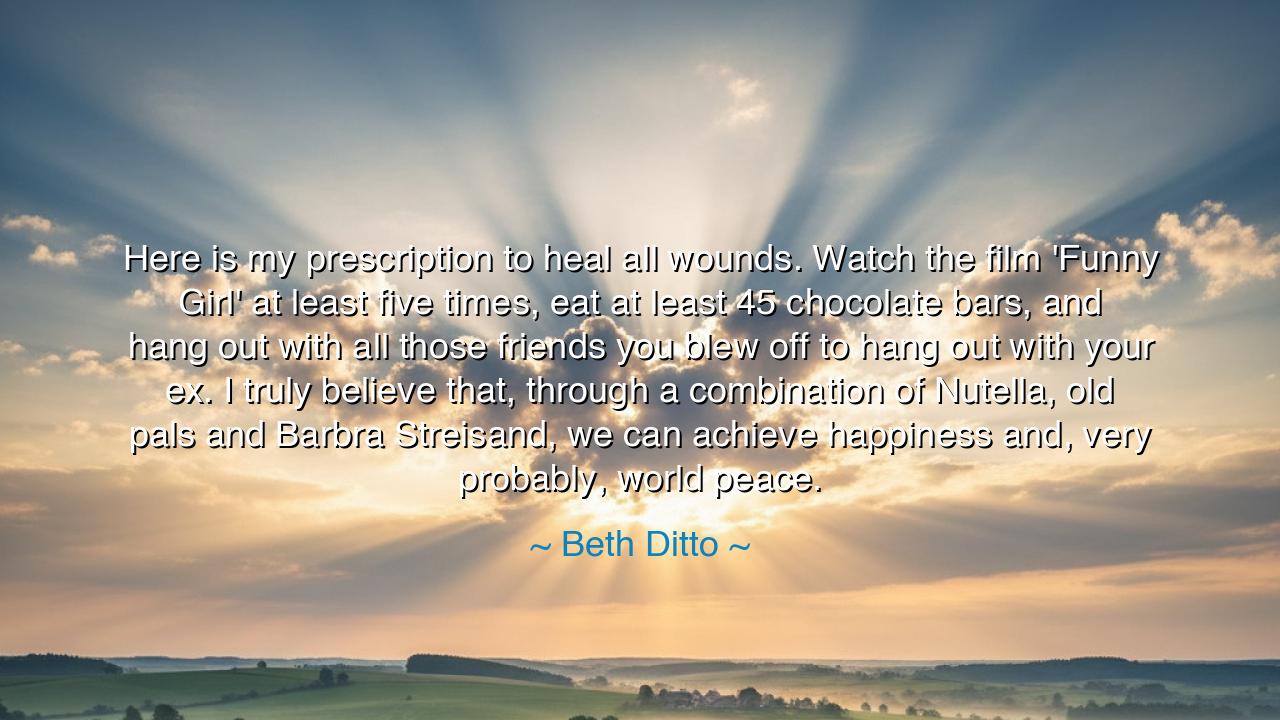
Here is my prescription to heal all wounds. Watch the film 'Funny
Here is my prescription to heal all wounds. Watch the film 'Funny Girl' at least five times, eat at least 45 chocolate bars, and hang out with all those friends you blew off to hang out with your ex. I truly believe that, through a combination of Nutella, old pals and Barbra Streisand, we can achieve happiness and, very probably, world peace.






Hear, O children of laughter and heartbreak, the playful yet profound words of Beth Ditto, who declared: “Here is my prescription to heal all wounds. Watch the film ‘Funny Girl’ at least five times, eat at least 45 chocolate bars, and hang out with all those friends you blew off to hang out with your ex. I truly believe that, through a combination of Nutella, old pals and Barbra Streisand, we can achieve happiness and, very probably, world peace.” Though her words sparkle with humor and mischief, beneath them lies a radiant truth about the nature of healing, friendship, and joy. For she speaks not only of curing a broken heart, but of restoring the human spirit through the simplest acts of connection, comfort, and art.
When Ditto prescribes “45 chocolate bars” and multiple viewings of Funny Girl, she does not speak as a physician of the body, but as a healer of the soul. She understands that sorrow, especially the sorrow of love lost, cannot always be reasoned away—it must be soothed, tended, and allowed to melt like chocolate upon the tongue. In her playful exaggeration, she offers a deeper wisdom: that pleasure and beauty are not frivolous—they are medicine. The taste of sweetness, the company of laughter, the voice of Barbra Streisand singing “Don’t Rain on My Parade”—these things remind us that life is still delicious, still worth savoring, even after the storms of pain have passed.
The film Funny Girl, to which she gives near-religious reverence, is not chosen at random. It tells the story of Fanny Brice, a woman who rises from obscurity with talent, humor, and determination, and who learns that love, while powerful, is not the sole measure of a person’s worth. In commanding us to watch it “at least five times,” Ditto calls us to witness again and again the resilience of the spirit, the courage to laugh at life’s absurdities, and the strength to move forward even when the heart is bruised. Just as the ancients once turned to epic poems to remind themselves of heroism and virtue, she points us to a modern myth—a story of music, struggle, and self-worth wrapped in song and laughter.
And what of her mention of “old pals”—those friends we abandon for love’s brief fire? This, too, is wisdom of the ages. For when the illusions of passion fade, it is friendship that remains—the steady hearth that warms when romance has grown cold. Ditto reminds us that healing does not happen in solitude, but in the embrace of those who truly know us. To return to one’s friends after heartbreak is an act of humility and renewal, much like Odysseus returning home after years of wandering. It is to rediscover the strength that comes from belonging, and to remember that no soul is healed by isolation.
There is, too, a joyous rebellion in her words. When Ditto speaks of Nutella and chocolate, she defies the cold logic of restraint that governs so much of modern life. She teaches that pleasure is not sin, but sacrament. In dark times, the body and the spirit must both be nourished; indulgence, when guided by joy and gratitude, becomes holy. Just as the philosophers of old sought balance between discipline and delight, she reminds us that laughter, sweetness, and art are the sacred triad that restores the weary heart. They are the simple miracles within reach of every mortal—no temple required, no doctrine preached.
Her final jest—that such things might bring about “world peace”—is, beneath its humor, a vision of truth. For what divides the world more than unhealed hearts, and what could unite it faster than shared joy? If all people learned to seek comfort in beauty, laughter, and companionship rather than in anger or pride, peace might indeed come closer than we imagine. She invites us to see the small acts of joy—watching a favorite film, eating something sweet, laughing with friends—not as escapism, but as acts of spiritual restoration. In healing ourselves, we become kinder; in finding joy, we become peacemakers.
Therefore, my children of heart and hope, heed this gentle prescription. When life wounds you, feed your spirit as you would your body. Watch the films that lift your soul, even if you must watch them five or fifty times. Eat the chocolate without guilt, for it, too, is a prayer of pleasure. Seek out the friends you have neglected, and let laughter cleanse your sorrow. And above all, remember this: healing need not be solemn. The sacred can be sweet, the profound can be funny, and joy, when shared, is a kind of salvation.
So, as Beth Ditto teaches, let not heartbreak or hardship steal from you the simple wonders of life. Through friendship, art, and sweetness—through Nutella, old pals, and Barbra Streisand—you may find that happiness is not distant, but already waiting within you. And perhaps, if enough hearts are healed this way, laughter itself might indeed lead us to peace.






AAdministratorAdministrator
Welcome, honored guests. Please leave a comment, we will respond soon